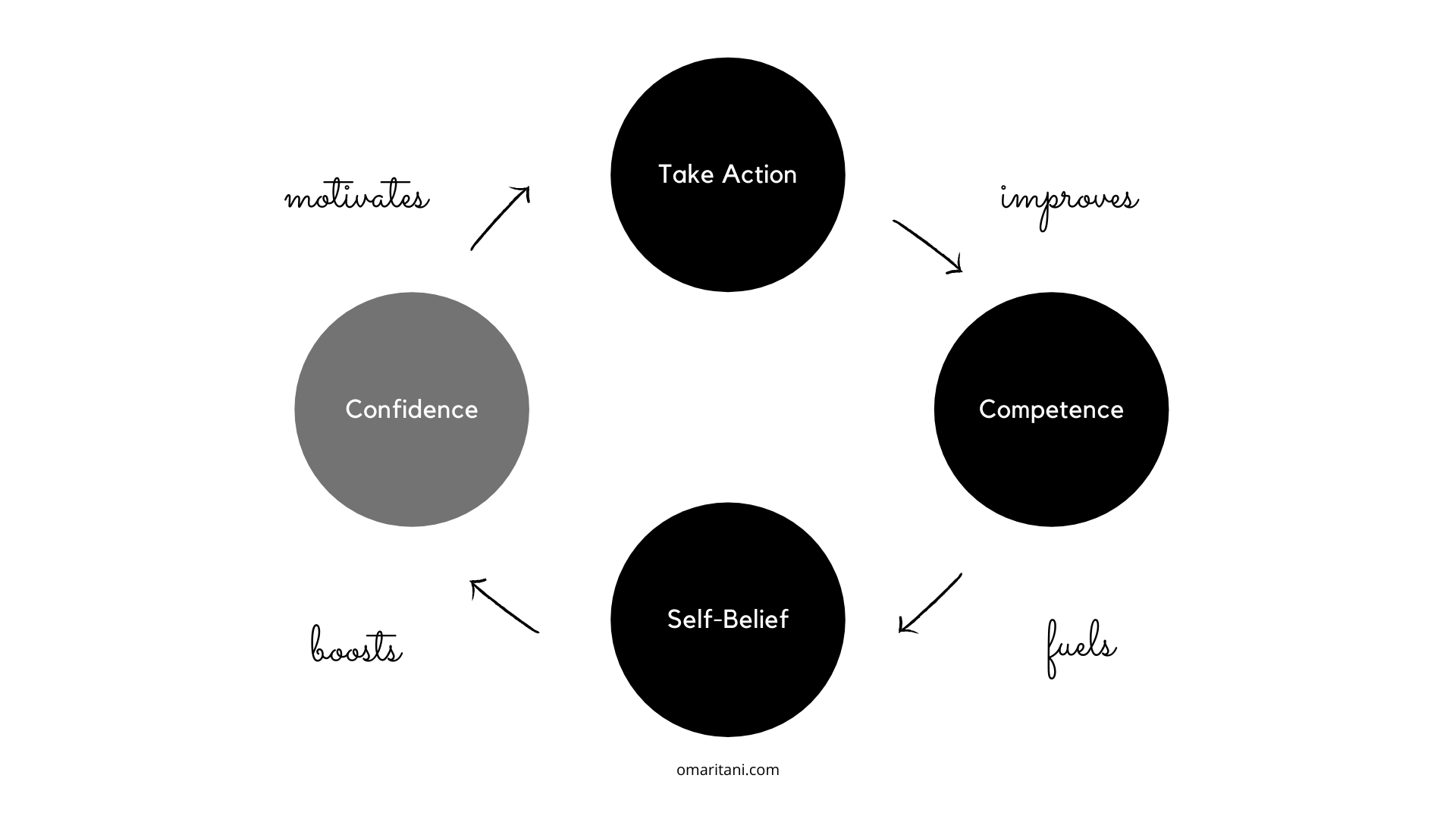The Confidence Cycle: Taking Action is How You Boost Your Confidence
Photo by Simon on Unsplash.com
People assume that confidence is this magic pill that you can take every morning for breakfast.
It isn’t.
There is no secret to how you can become a more confident person; but there are a few factors that contribute to it: your self-belief, your competence in your area of work, past experiences. And yet, these factors are simply influential indicators that can sway you across a spectrum of confidence—they’re driven by one single force of power: Taking action.
That’s the answer to your question of “how do I become a more confident person.”
You take action against the thing you’re not confident about.
Do you want to know how I became a confident writer? I wrote and published an article. Then I wrote and published another. And then another. With every new line, I discovered a greater sense of self-belief, with every new story, my voice amplified, and with every new set of articles, my confidence expanded.
Taking action is how you boost your confidence. To understand why let’s take a look at the cycle of confidence.
The Confidence Cycle
There’s a cycle to building up your confidence and it’s this: The more we do something, the more competence we develop for it, the more we fuel our inner self-belief, and the more confident we become at it.
Let’s say you want to become a writer but you’re not confident in your writing abilities.
That’s okay. All great writers started exactly where you are today: lacking confidence and swimming in a pool of self-doubt. But here’s what sets apart all aspiring writers from professional writers: The latter started writing, the former didn’t.
“Action comes before the confidence to act. It’s action that begets confidence, not the other way around.”
That’s what separates want-to-be entrepreneurs from actual entrepreneurs—the first group has yet to take action on their ideas, the second already has.
Here’s how the cycle of confidence works:
You take action. Regardless of how you feel (and assuming you really want to become a writer), you must pick up a pen and write. You must open a new document and start typing. You must take action. You will never feel ready enough—but that doesn’t matter, you start anyway.
When you take action, you become more competent. Too often we don’t feel confident because we believe we’re not good at what it is want to do. You want to start a business, but you don’t know how, so you dwindle down and resist the urge to try. But that’s the wrong attitude. You must get started—you will make mistakes, but you will learn. You will figure things out as you go because your knowledge will expand with experience. Once you get the ball rolling and start taking action—once you start writing a few articles and publishing them—you begin to feel more competent in the work you do.
Competence fuels your self-belief. This growing competence in your work will begin to fuel your self-belief. You start to think “I can do this",” “I can figure it out,” “I’m getting better.” Your work production becomes a validation to yourself that yes—you can do it.
Action, competence, and self-belief—all three—work together to boost your confidence. As you invest more time into your work, you continue to improve your competence which fuels your self-belief. This is when you’ll naturally start to feel more confident—you know what you’re doing, you know you’re good at it, and your actions have validated this belief.
Higher confidence motivates more action. The more confident you become, the more likely you are to feed that confidence back into the loop of taking action. This is because you’re now building momentum. You’re feeling the change happening in you and around you. You’re producing work and you’re projecting confidence. There’s nothing that can stop you now.
What Stops You From Taking Action
While it’s clear that taking action is the force that drives your confidence up, there might be some mental blocks standing in the way.
Here are four of them:
Fear of criticism or judgment (internal or external).
Procrastination.
Lack of time.
Lack of clarity.
Fear can be paralyzing, and usually there are six fears that stop us from moving our life in the right direction. But when you let go of your inner-critic, you lose its power over you and you free yourself to act. When you let go of the fear of judgment of others, you lose its power over you and you free yourself to act.
Procrastination is something we all have to deal with, and the lack of time stems from two things: a lack of clarity on our priorities and a lack of conducive productivity habits. So if you learn why you procrastinate, and how to deal with it, you will automatically free up time to take action on what really matters.
The last thing that could stand in our way is the lack of clarity—the idea of “I don’t know how to start.” Look, everyone starts with nothing. And to go from nothing to something, you simply get started on the process. You research, you read, you learn.
The reality of life is this: Action brings more clarity than thought.
The best way of getting out of the repetitive chatter of the thoughts in our mind is to simply take one small action. We learn by doing. We get clarity by doing. We find the answers by doing. It’s what Rumi meant by these words “as you walk on the way, the way appears.”
What it Means to You
The four obstacles above will continue to be roadblocks unless you really do want to become better in the area you don’t feel confident in. So the question comes down to this:
“Do you really want to get good at it?”
Do you really want to get good at walking up to strangers and sparking a conversation? Ok. Then go and start doing it.
Do you really want to get good at dating? Ok. Then go and ask more people out on dates.
Do you really want to get good at public speaking? Ok. Then go and start delivering speeches.
Do you really want to get good at writing? Ok. Then go and start publishing articles daily.
You need to get uncomfortable. You need to get out of that comfort zone if you wish to grow and become more confident.
This is how you boost your confidence in the area you don’t feel confident in— you take action.
Because action comes before the courage to act. It’s action that begets courage, not the other way around. Action comes before the confidence to act. It’s action that begets confidence, not the other way around.

